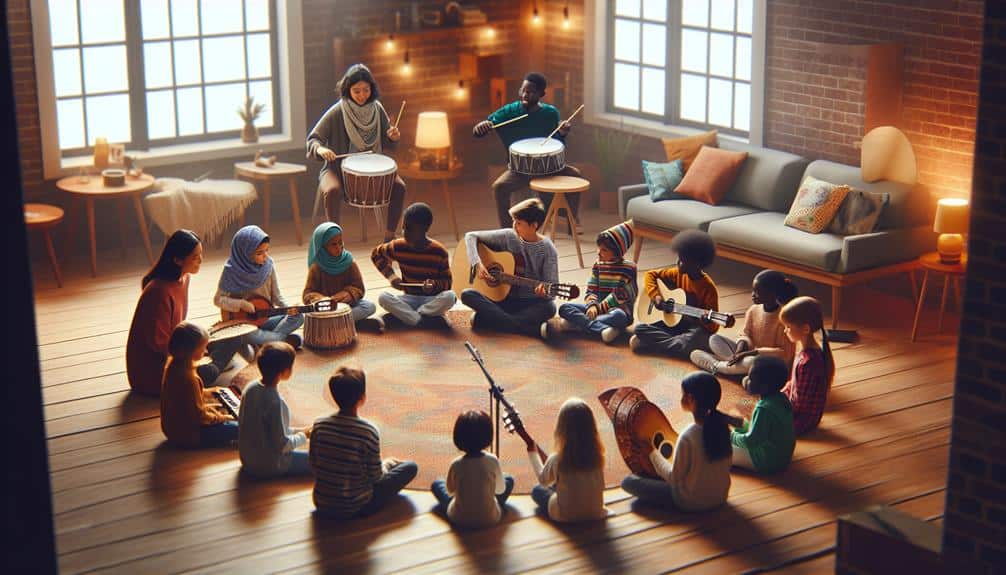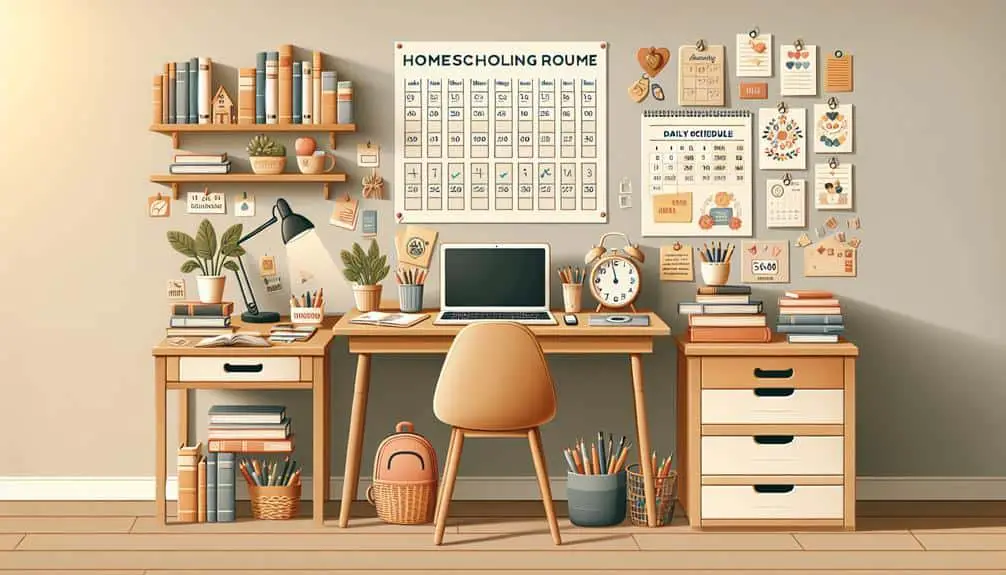Immerse yourself in your homeschooling journey with music! Begin by delving into artist biographies and curating diverse playlists. Participate in family music jams, where you select instruments to learn and exchange musical preferences. Engage in entertaining music theory games and collaborate on compositions. Foster musical storytelling and organize creative showcases. Enroll in virtual music classes for expert guidance and personalized feedback. Uncover how music intertwines with history and culture. Finally, transform your home into a lively stage for family music performances that highlight each member's talents. Your musical odyssey awaits!
Key Points
- Engage in active listening sessions to explore diverse music genres and styles.
- Start family music jams to bond over music and learn instruments together.
- Incorporate music theory games and quizzes for a structured learning experience.
- Encourage creative musical projects to nurture storytelling and composition skills.
- Attend virtual music classes and masterclasses for expert guidance and personalized feedback.
Music Appreciation Through Listening
Immerse yourself in the world of music through active listening sessions to enhance your music appreciation skills in homeschooling. By creating diverse music playlists that span various genres and time periods, you can introduce yourself and your children to a wide array of musical styles, fostering a deeper understanding and love for music.
Explore artist biographies to learn about the lives and inspirations behind the music, gaining valuable insights that will enrich your listening experience.
Craft playlists that cater to different moods, occasions, or even historical periods, allowing you to discover the versatility and beauty of music. As you explore artist biographies, you'll uncover the stories of musicians who've shaped the musical landscape, providing context and depth to the songs you hear.
Understanding the backgrounds and influences of artists can offer a new perspective on their music, making each listening session a journey of discovery and appreciation. So, set aside time for active listening sessions, and let the melodies transport you to new worlds of musical wonder.
Learning Instruments as a Family
Get ready to amplify the music in your homeschooling journey by learning instruments as a family.
Imagine the joy of family music jams where each member contributes their unique sound.
Through instrument exploration together, you can create unforgettable bonding experiences that foster a love for music in your home.
Family Music Jams
Involve your family in the joy of music by starting on a journey of learning instruments together through Family Music Jams. These musical gatherings aren't only about playing instruments but also about building creative collaborations and fostering beautiful musical memories that will last a lifetime.
During Family Music Jams, each family member can choose an instrument they're interested in learning. Whether it's the guitar, piano, drums, or even a ukulele, everyone can contribute their unique sound to create harmonious melodies.
These jams provide an opportunity for family members to share their musical preferences, learn from each other, and grow together in their musical abilities.
Through Family Music Jams, you can create a nurturing environment where everyone feels encouraged to explore their musical talents. These sessions aren't just about learning to play instruments but also about bonding with your loved ones over a shared passion for music.
Instrument Exploration Together
Embark on a musical journey with your family by exploring and learning instruments together in a harmonious and creative way. Immerse yourselves in the world of music through instrument workshops where you can discover new sounds and rhythms as a family unit. These workshops provide a hands-on experience, allowing each member to experiment with different instruments, fostering a deeper appreciation for music.
Engage in DIY music projects where you can build your own instruments or customize existing ones. This hands-on approach not only enhances creativity but also strengthens the bond between family members as you collaborate on musical endeavors. Explore music games that make learning instruments fun and interactive. These games can range from identifying different sounds to creating melodies together, making the learning process enjoyable for everyone involved.
Encourage creative exploration by setting aside dedicated time each week to practice playing instruments together. This shared experience not only enhances musical skills but also creates lasting memories that your family will cherish.
Embrace the joy of making music as a family, and let the harmonious melodies fill your home with warmth and creativity.
Incorporating Music Theory Lessons
Get ready to expand your musical horizons by incorporating music theory lessons into your homeschooling curriculum!
Engage in interactive theory activities that make learning fun and engaging, and supplement your knowledge with online video tutorials.
Interactive Theory Activities
Exploring interactive theory activities can enhance music theory lessons, making learning engaging and dynamic for homeschool students. Immerse yourself in these exciting activities to deepen your understanding of music theory:
- Music Theory Games: Engage in fun and educational games that challenge your knowledge of notes, scales, and chords. From digital apps to traditional board games, there are plenty of options to make learning theory enjoyable.
- Interactive Quizzes: Test your knowledge through interactive quizzes that provide instant feedback. These quizzes can help reinforce concepts and identify areas that need further review.
- Collaborative Composition Tasks: Work with fellow homeschoolers or family members to create original compositions. By collaborating, you can apply music theory principles in a practical and creative way.
- Hands-On Experiments: Explore music theory through hands-on experiments like building homemade instruments or visualizing sound waves. These experiments offer a tactile and visual way to grasp theoretical concepts.
Online Video Tutorials
Immerse yourself in a world of enriching musical knowledge by delving into online video tutorials that seamlessly incorporate essential music theory lessons. Virtual workshops and interactive lessons can be your gateway to understanding music theory in a fun and engaging way.
These online tutorials offer skill-building opportunities that cater to learners of all levels, from beginners to advanced musicians. Through online video tutorials, you can explore a wide range of music theory concepts such as rhythm, harmony, scales, and more.
These resources provide a structured learning environment where you can progress at your own pace, pausing and rewinding as needed to fully grasp each concept.
Creating Musical Projects and Presentations
Enhance your homeschool musical curriculum by encouraging your child to immerse themselves in designing and presenting innovative musical projects that showcase their creativity and skills. Explore the world of music through exciting projects that not only educate but also inspire a deep love for musical expression.
Here are some engaging ideas to get you started:
- Musical storytelling: Encourage your child to create a musical piece that tells a story, whether it's through lyrics, instrumental composition, or a combination of both.
- Collaborative compositions: Foster teamwork by having your child collaborate with siblings or friends to create a musical composition together, blending different styles and ideas.
- Instrumental demonstrations: Explore the world of different instruments by having your child showcase their skills on various instruments, allowing them to discover new sounds and techniques.
- Creative showcases: Host a mini-concert at home where your child can perform their musical projects for the family, boosting their confidence and stage presence.
These projects won't only enrich your child's musical education but also nurture their passion for creativity and self-expression.
Virtual Music Classes and Workshops
Consider enrolling your child in virtual music classes and workshops to broaden their musical knowledge and skills. Through virtual masterclasses, your child can receive expert guidance and insights from accomplished musicians without leaving your home. These sessions often offer in-depth discussions, live demonstrations, and opportunities for personalized feedback, enhancing your child's understanding and proficiency in music.
Online music workshops provide interactive sessions where your child can engage in group activities, collaborate with peers, and explore various musical concepts together. These workshops not only foster a sense of community but also encourage creativity and teamwork, all essential skills for a well-rounded musician.
Music in History and Culture Studies
Immerse yourself in the rich tapestry of music history and cultural influences to deepen your understanding and appreciation of music in your homeschooling curriculum.
Music isn't just notes and rhythms; it carries within it the echoes of the past and the essence of diverse cultures. By exploring music in history and culture studies, you can reveal a world of knowledge and creativity that will enrich your educational journey.
Here's how to incorporate it effectively:
- Historical Influences: Trace the evolution of music through different time periods and how it has shaped societies.
- Cultural Significance: Explore how music reflects the values, beliefs, and traditions of different cultures worldwide.
- Societal Impacts: Examine how music has influenced and been influenced by social movements and historical events.
- Artistic Expressions: Analyze how artists use music as a medium for self-expression, storytelling, and conveying emotions.
Hosting Family Music Performances
Transform your homeschooling space into a vibrant stage for unforgettable family music performances that will inspire and unite your household through the power of music.
Encouraging parent involvement and audience participation can make these performances truly special. Consider organizing theme-based performances where each family member can showcase their musical talents. Whether it's a Broadway musical night, a classical music showcase, or a rock band extravaganza, the possibilities are endless.
To make these family music performances even more engaging, involve everyone in the planning process. Let each family member contribute ideas for the theme, song selections, costumes, and stage setup. This collaborative effort not only fosters creativity but also strengthens family bonds through shared experiences.
Frequently Asked Questions
How Can Music Education Benefit My Child's Overall Academic Performance?
Music education benefits your child's overall academic performance by enhancing cognitive development, fostering emotional expression, improving academic skills, and boosting social interactions. It nurtures creativity, discipline, and teamwork, leading to well-rounded individuals.
Are There Resources Available for Teaching Music Theory to Young Children?
Yes, there are resources available for teaching music theory to young children. Interactive apps and online games make learning fun and engaging. Hands-on activities and worksheets provide a tactile approach to understanding musical concepts.
What Are Some Creative Ways to Integrate Music Into Other Subjects?
Did you know that students who learn music have higher test scores in math and reading? Make learning fun by creating cross-curricular connections and incorporating music into other subjects with creative lesson plans and engaging activities.
How Can I Find Virtual Music Classes Suitable for Different Age Groups?
To find virtual music classes suitable for different age groups, explore online resources like musictheory.net. They offer engaging lessons and activities tailored to various skill levels. Discover the perfect class that fits your child's age and musical interests today!
What Are the Benefits of Including Music in History and Culture Studies?
Explore the rich tapestry of human experience through music. Cultivate cultural appreciation and historical context, fostering social development and emotional expression. Music weaves stories of the past, connecting hearts and minds across time.



